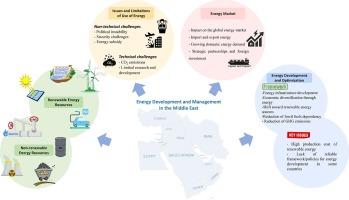Energy development and management in the Middle East: A holistic analysis
IF 9.9
1区 工程技术
Q1 ENERGY & FUELS
引用次数: 0
Abstract
The Middle East (ME) has undergone substantial changes in the energy landscape in recent years due to considerable variations in energy demand trends, economic/political upheaval, and climate change. The ME energy heavily relies on limited fossil fuel resources, which cause adverse climate change. Considering its geographical location, this region has huge potential for developing clean and sustainable energy resources, which will simultaneously satisfy its increasing energy demand and address climate change concerns. This review paper provides a comprehensive overview of non-renewable and renewable energy resources and their current status and future prospects in the ME. Moreover, it discusses in detail the energy utilization, management, and challenges associated with their development in the ME. Further, it examines the adverse effects of energy development on environment and health. The cost of energy development and current market status in the ME are also precisely analyzed. In particular, this review paper systematically assesses the energy policies and frameworks in the ME with consideration of political relations and governmental regulations. The outcomes of this study confirm that energy transition to renewable resources in the ME requires investment, research, and precise frameworks and policies. Therefore, the ME still has to go a long way to reliably count on renewable energy as the main energy source.

中东的能源开发与管理:整体分析
近年来,由于能源需求趋势的巨大变化、经济/政治动荡和气候变化,中东(ME)的能源格局发生了巨大变化。中东地区的能源严重依赖于有限的化石燃料资源,而化石燃料资源会导致不利的气候变化。考虑到其地理位置,该地区在开发清洁和可持续能源资源方面潜力巨大,这将同时满足其日益增长的能源需求并解决气候变化问题。本综述全面概述了中东部地区的不可再生能源和可再生能源及其现状和未来前景。此外,它还详细讨论了能源利用、管理以及与中东部地区能源开发相关的挑战。此外,报告还探讨了能源开发对环境和健康的不利影响。报告还精确分析了中东部地区能源开发的成本和市场现状。特别是,本综述文件系统地评估了中东部地区的能源政策和框架,其中考虑到了政治关系和政府法规。研究结果证实,中东部地区向可再生资源的能源转型需要投资、研究以及精确的框架和政策。因此,要可靠地将可再生能源作为主要能源来源,中东部地区还有很长的路要走。
本文章由计算机程序翻译,如有差异,请以英文原文为准。
求助全文
约1分钟内获得全文
求助全文
来源期刊

Energy Conversion and Management
工程技术-力学
CiteScore
19.00
自引率
11.50%
发文量
1304
审稿时长
17 days
期刊介绍:
The journal Energy Conversion and Management provides a forum for publishing original contributions and comprehensive technical review articles of interdisciplinary and original research on all important energy topics.
The topics considered include energy generation, utilization, conversion, storage, transmission, conservation, management and sustainability. These topics typically involve various types of energy such as mechanical, thermal, nuclear, chemical, electromagnetic, magnetic and electric. These energy types cover all known energy resources, including renewable resources (e.g., solar, bio, hydro, wind, geothermal and ocean energy), fossil fuels and nuclear resources.
 求助内容:
求助内容: 应助结果提醒方式:
应助结果提醒方式:


